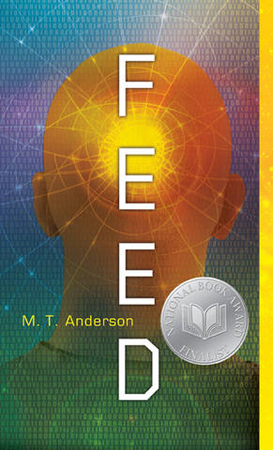 I used to think M.T. Anderson was prescient. Now I’m convinced he’s psychic.
I used to think M.T. Anderson was prescient. Now I’m convinced he’s psychic.
Anderson is the author of the young-adult novel Feed, a very funny — and deeply disturbing — book about the seductive power of social media. In the world of the novel, the fortunate have a “feed” implanted in their brains at birth, connecting them to a network that allows them to communicate with one another, influences their consumer decisions, and, over time, takes over parts of their brain function. Complications ensue.
Sound familiar? Right, it’s not quite reality, but it’s a pretty good approximation of modern life.
Feed was published in 2002, and it’s been a mental metaphor of mine for years. When I’ve spent an entire day chasing stories online, or when I catch myself discussing Facebook posts during a real-life conversation, I think: I need to take a break from the Feed. It’s a useful private joke, a way of drawing a boundary around the online world.
But here’s what worries me: Feed foresaw Facebook-style targeted advertising, and it foresaw Google Glass. In fact, a Google-Glass-like device appears in the novel as a laughably antique version of the feed, which means … oh, jeez. If Anderson’s predictions keep coming true, how much longer will we be able to take a break from the feed?
I appreciate technology. It makes my life easier and more interesting in countless ways. But like anyone else, I’d much rather use it than be used by it, and M.T. Anderson’s dystopian vision reminds me to maintain that distinction. If I could, I’d put Feed on every high-school curriculum. Perhaps it could replace Animal Farm: As brilliant as Orwell was, he never imagined the pigs in charge of sponsored posts.
And here I am reading your blog…. HA!
Will check out the book. Sounds very interesting.
Isn’t it interesting that “adult” fiction has hardly touched on the big issues of our time, including global change? Young adult and sci-fi writers are confronting reality through imagination while “adult” fiction is still committing adultery, going on long journeys, etc. “Realism” is still in fashion, but it is actually no longer “real.”
Great point, Mary Ellen – in adult fiction, seems like writing about an “issue” in any sense gets you labeled as a genre author … & so literary fiction focuses on the specifics of character, often to the exclusion of larger ideas. Of course there’s a lot of bad SF and YA, but books like Feed make me realize that it’s possible to have both complex characters and big issues.